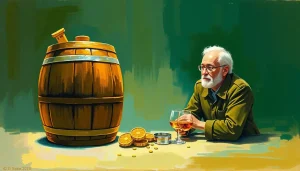Fortune-hunting investors are discovering that some of Scotland’s most valuable treasures aren’t buried in ancient castles, but are quietly aging in oak barrels across the Highlands. The allure of liquid gold has captivated the hearts and wallets of savvy investors worldwide, as whisky cask investing emerges as a tantalizing opportunity in the world of alternative investments.
Imagine the rich aroma of oak and peat, mingling with the promise of substantial returns. That’s the essence of whisky cask investing – a realm where passion meets profit, and patience is rewarded with potentially remarkable gains. But before you rush to claim your stake in this spirited market, let’s embark on a journey through the intricacies of whisky cask investing.
A Toast to History: The Rise of Whisky as an Investment
Whisky has long been cherished as a drink of distinction, but its status as an investment vehicle is a relatively recent phenomenon. The roots of whisky investing can be traced back to the 1980s when collectors began to recognize the value of rare and aged bottles. However, it wasn’t until the early 2000s that whisky cask investing started to gain traction.
The past decade has witnessed an explosion of interest in whisky cask investments. What was once the domain of distilleries and a handful of connoisseurs has now become accessible to a broader range of investors. This surge in popularity can be attributed to several factors, including increased global demand for premium spirits, a growing appreciation for the craftsmanship of whisky production, and the potential for significant returns.
It’s worth noting that while we’re focusing on Scotch whisky here, there’s a whole world of whiskey barrel investing opportunities beyond Scotland’s borders. From the bourbon-soaked barrels of Kentucky to the peated casks of Japan, each region offers its own unique investment prospects.
Understanding the Whisky Cask Market: A Barrel of Opportunities
Diving into the world of whisky cask investing requires a solid understanding of the market dynamics. Let’s uncork the essentials:
1. Types of Whisky Casks
Not all casks are created equal. The most common types you’ll encounter are:
– Ex-Bourbon Casks: These are the workhorses of the whisky world, imparting vanilla and caramel notes.
– Sherry Casks: Prized for the rich, fruity flavors they lend to the whisky.
– Port Casks: These add a touch of sweetness and red fruit character.
– Virgin Oak Casks: Less common but valued for their intense oak influence.
2. Factors Affecting Whisky Cask Value
Several elements contribute to a cask’s potential worth:
– Age: Generally, older whiskies command higher prices.
– Rarity: Limited edition or single cask releases can fetch premium prices.
– Distillery Reputation: Renowned distilleries often see their casks appreciate more rapidly.
– Cask Type: Some cask types are more sought-after than others.
– Market Demand: Trends in consumer preferences can impact cask values.
3. Key Regions for Whisky Production and Investment
While Scotland reigns supreme in the whisky world, other regions are making their mark:
– Speyside: Home to many of Scotland’s most famous distilleries.
– Islay: Known for its peated whiskies with distinctive smoky flavors.
– Highland: A diverse region producing a wide range of styles.
– Lowland: Traditionally known for lighter, more delicate whiskies.
– Campbeltown: Once a whisky powerhouse, now home to just three distilleries.
The Golden Benefits of Whisky Cask Investing
Investing in whisky casks offers a unique set of advantages that have caught the attention of both seasoned investors and newcomers to the world of alternative investments.
1. Potential for High Returns
The whisky cask market has shown impressive growth in recent years. Some investors have reported returns of 10-20% per annum, with exceptional cases yielding even higher profits. However, it’s crucial to remember that past performance doesn’t guarantee future results.
2. Portfolio Diversification
In a world of volatile stock markets and low-interest rates, whisky casks offer an opportunity to diversify your investment portfolio. As a tangible asset, whisky casks can provide a hedge against inflation and market fluctuations.
3. A Tangible Asset with Intrinsic Value
Unlike stocks or bonds, whisky casks are physical assets that you can see, touch, and even taste (though sampling your investment might not be the wisest financial move). This tangibility can provide a sense of security and connection to your investment that’s hard to replicate with more abstract financial instruments.
4. Tax Advantages
Depending on your jurisdiction, whisky cask investments may offer certain tax benefits. For example, in the UK, whisky casks are considered a “wasting asset” by HMRC, which can lead to favorable tax treatment in some circumstances. However, it’s essential to consult with a tax professional to understand the implications for your specific situation.
Navigating the Risks: Challenges in Whisky Cask Investing
While the potential rewards of whisky cask investing are enticing, it’s crucial to approach this market with a clear understanding of the risks involved.
1. Market Volatility and Price Fluctuations
Like any investment, the whisky cask market is subject to fluctuations. Factors such as changes in consumer tastes, global economic conditions, and shifts in supply and demand can all impact the value of your casks.
2. Storage and Insurance Considerations
Proper storage is crucial to maintaining the quality and value of your whisky casks. Most investors opt to keep their casks in bonded warehouses, which provide optimal conditions for maturation. However, this comes with ongoing costs for storage and insurance that need to be factored into your investment calculations.
3. Authenticity and Provenance Issues
As the popularity of whisky cask investing has grown, so too has the risk of fraud. Ensuring the authenticity and provenance of your casks is paramount. Working with reputable brokers and conducting thorough due diligence can help mitigate this risk.
4. Regulatory and Legal Challenges
The whisky industry is heavily regulated, and navigating the legal landscape can be complex. From customs and excise regulations to labeling requirements, there’s a lot to consider when investing in whisky casks.
Embarking on Your Whisky Cask Investment Journey
Ready to dip your toe (or should we say, your nose) into the world of whisky cask investing? Here’s how to get started:
1. Research Distilleries and Brands
Begin by familiarizing yourself with different distilleries and their reputations. Some names to consider include Macallan, Bowmore, and Dalmore, but don’t overlook lesser-known distilleries that might offer hidden gems.
2. Work with Reputable Whisky Cask Brokers
A good broker can be invaluable in navigating the whisky cask market. They can provide access to a wide range of casks, offer expert advice, and handle the logistics of purchase and storage. Look for brokers with a solid track record and positive reviews from other investors.
3. Due Diligence and Authentication
Before making any purchase, ensure you’ve done your homework. Request detailed information about the cask, including its provenance, current alcohol by volume (ABV), and recent sampling results. If possible, arrange for an independent assessment of the cask.
4. Budgeting and Financial Planning
Determine how much you’re willing to invest and factor in ongoing costs such as storage, insurance, and potential re-gauging fees. Remember, whisky cask investing is typically a medium to long-term investment, so ensure you’re comfortable with tying up your capital for several years.
Managing and Selling Your Liquid Gold
Once you’ve acquired your whisky casks, the journey is far from over. Proper management and a well-thought-out exit strategy are crucial to maximizing your returns.
1. Monitoring Cask Maturation and Value
Regularly check on the progress of your casks. Most warehouses offer annual re-gauging services, which provide information on the cask’s volume and ABV. This data can help you track the cask’s development and estimate its current value.
2. Options for Selling Casks
When the time comes to sell, you have several options:
– Private Buyers: Selling directly to collectors or other investors.
– Auctions: Specialist whisky auctions can be a good way to reach a wide audience of potential buyers.
– Bottling: Converting your cask into bottles can sometimes increase its overall value, but comes with additional costs and considerations.
3. Reinvesting Profits
Many successful whisky cask investors choose to reinvest their profits back into the market. This can help build a diverse portfolio of casks at different ages and from various distilleries.
4. Building a Diverse Whisky Cask Portfolio
Just as with traditional investments, diversification is key in the whisky cask market. Consider spreading your investments across different distilleries, cask types, and age profiles to balance risk and potential returns.
The Future of Whisky Cask Investing: A Dram of Prediction
As we look to the future, the whisky cask investment market shows no signs of losing its luster. Global demand for premium spirits continues to grow, particularly in emerging markets like China and India. This increasing demand, coupled with the finite supply of aged whisky, suggests that the market may continue to see strong growth in the coming years.
However, it’s important to approach whisky cask investing with a balanced perspective. While the potential returns can be significant, this is not a get-rich-quick scheme. Success in whisky cask investing requires patience, knowledge, and a willingness to navigate the unique challenges of this market.
For those willing to put in the time and effort, whisky cask investing offers a fascinating blend of passion and profit. It’s an opportunity to own a piece of Scotland’s liquid history while potentially reaping substantial financial rewards.
As you contemplate whether whisky cask investing is right for you, remember that it’s just one of many alternative investment options available. You might also want to explore bourbon investing or wine investing as complementary strategies to diversify your alternative investment portfolio.
In conclusion, whisky cask investing offers a unique opportunity to combine the pleasure of fine spirits with the potential for significant financial returns. As with any investment, it’s crucial to do your research, understand the risks, and make informed decisions. Whether you’re a whisky enthusiast looking to turn your passion into profit or an investor seeking to diversify your portfolio, the world of whisky cask investing awaits – rich with possibility and brimming with the promise of liquid gold.
So, here’s to smart investing and the enduring allure of Scotland’s national spirit. Sláinte!
References
1. Scotch Whisky Association. (2021). “Scotch Whisky Economic Impact Report 2020.” Available at: https://www.scotch-whisky.org.uk/insights/economic-impact-report-2020/
2. HMRC. (2022). “Excise Notice 196: Excise Goods – Registration and Approval of Warehousekeepers, Warehouse Premises, Owners of Goods and Registered Consignors.”
3. Knight Frank. (2021). “The Wealth Report 2021: The Global Perspective on Prime Property and Investment.”
4. Rare Whisky 101. (2022). “Rare Whisky Market Report 2021.”
5. Whisky Investment Partners. (2021). “The Ultimate Guide to Whisky Cask Investment.”
6. The Spirits Business. (2022). “Global Whisky Market Trends and Forecasts 2022-2027.”
7. Whisky Advocate. (2021). “The Rise of Cask Strength Whisky: Market Trends and Consumer Preferences.”
8. International Wine & Spirit Research. (2022). “Global Trends in the Spirits Industry: Focus on Whisky.”
9. Bonhams. (2021). “Whisky Market Review 2020 and Outlook for 2021.”
10. Cask 88. (2022). “Scottish Whisky Cask Market Report 2021-2022.”












Would you like to add any comments? (optional)